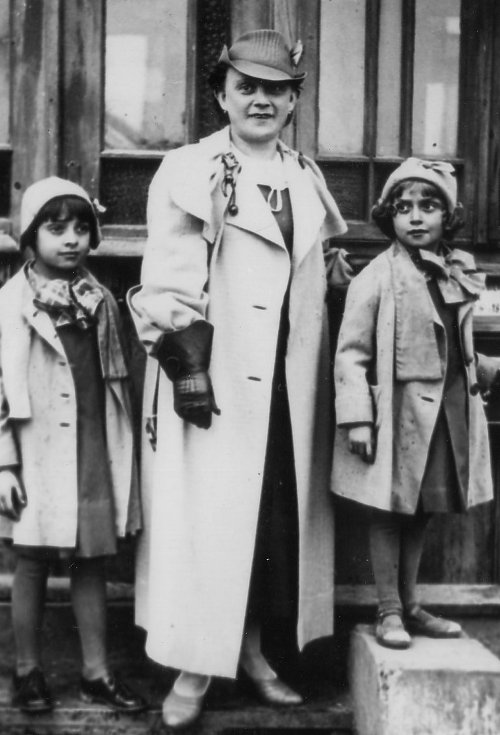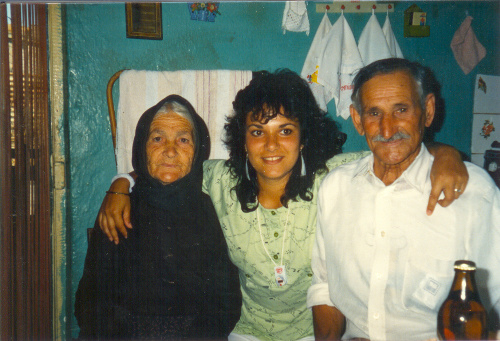
In a twelve-part documentary series, filmmaker Heddy Honigmann explores the truth of the notion that the way to the heart is through the stomach. She talks to twelve men and women as they prepare a special dish which evokes memories of someone they love.
A shtetl that’s no longer there (Yiddish vrennekes)
In A shtetl that’s no longer there, the director’s mother – Sonia Honigmann Pach – prepares ‘Yiddish vrennekes’ just like her mother used to make them during the icy cold winters in Poland. The vrennekes bring back memories of her native village Grabowiec (which was destroyed in the war), of close relatives who were killed by the Germans, and her flight to Peru. The film also paints a disarming portrait of a mother and her daughter.

From: a shtetl that's no longer there
Saudade (Granddad Antonio’s rabbit stew)
In Saudade, fado singer Mónica Triga and her mother make ‘wild rabbit’ stew, a recipe Mónica learnt from her Portuguese granddad. Mónica’s mother left the Portuguese dictatorship in 1965 for the Netherlands, while granddad stayed behind. Mónica talks and sings – in fados full of love and melancholy – about her grandfather’s simple, honest life.

Monica and her grandparents
Recipe for reconciliation (Iranian aubergine with mincemeat)
Shahrohk’s grandmother never cooked. She was an independent woman, who had little time for her daughter. However, one day grandma decided to demonstrate her love for her daughter by cooking for her for the first time in her life. She made Iranian aubergine for her daughter and grandchildren. Now, years later, Shahrohk gives cooking classes and teaches his students to make this dish. For the Iranian refugee Shahrohk this means a great deal. The aroma of traditional Persian dishes reminds him of his family and makes his sorrow more bearable.

Recipe for reconciliation
Music is the food of life (Mia’s special menu)
Mia Strobbe prepares the main course of the menu she made for her husband and children to thank them for the fantastic party they organized for her 50th birthday. While she’s cooking, she talks about her loving relationship with her husband Carlos and their shared passion for choral singing and good food. As Carlos puts it, ‘Music brought us together and food kept us together.’
The aroma of Christmas (Sausage rolls Catholic style)
Chef and author of several cookbooks Carla Kentgens prepares the sausage rolls that her mother always made for the entire family on Christmas Eve. As a child Carla was rewarded for helping her mother with the first, steaming roll. Nowadays Christmas still doesn’t feel complete without the smell of sizzling pork in pastry. While Carla demonstrates her skills to a cookery club, the women discuss what good food does for their love lives.
Mediterranean love (Italian stuffed mussels)
In the sixties Roely Ciari married an Italian immigrant worker. During their holidays in Italy, she was warmly welcomed into the family by her parents-in-law. From them she learnt the value of good food and long hours at the dining time. Remembering those special times and in memory of her husband, who died last year, she makes stuffed mussels using the recipe her mother-in-law Antonia taught her.
Discovering the peppermill (Tagliatelle with artichoke hearts)
IJsbrand Galama, a farmer’s son, grew up with traditional fare - potatoes, meat and home-grown veg were served for dinner. The loss of his father as well as his friendship with filmmaker Heddy Honigmann led to a decision to change his lifestyle. Not only has this enriched his life in a culinary sense, it also broadened his horizon. In the film he prepares the ‘exotic’ dish that Heddy introduced him to years ago.
With heart and soul (Chinese beauty soup)
Ching Lin Pang grew up in Belgium, where her family runs a Chinese restaurant. Despite their hectic and tough life, her mother always made time to prepare a good meal for her children. Lin honours her deceased mother by making a traditional soup full of healthy ingredients that purifies the body and creates beauty from within.
The love ingredient (Salmon trout and asparagus with egg sauce à la Joke)
Joke Vermaak prepares salmon trout and asparagus with egg sauce, a dish that she first made for her husband during a holiday in France. After he died she never made it again. His death also meant the end of their shared passion for cooking and dining. In The love ingredient she again prepares this special dish which evokes so many emotions.
Fingerprints in the pastry (Granny’s apple pie)
Inger Stokkink makes an apple pie in exactly the same way as her granny used to make it. The delicious smell brings back fond memories of the lively parties that came to an end – along with the family feeling - when her grandmother died. When she felt down, Inger found consolation in baking this apple pie. She remembers each and every step in her granny’s preparations and will never forget her fingerprints left in the dough.
Reconstruction of a pudding (Dorothea’s apple-bread pudding)
As a wild, adopted teenager Ropatja travelled around the world. She is still deeply impressed by her old landlady Dorothea, who spent her final years in Patagonia after a lifetime of prostitution. Through meeting her, Ropatja learnt not to judge other people too harshly. Together with a close friend, she attempts to prepare the simple apple pudding according to Dorothea’s recipe. By doing so she honours the woman who taught her such a valuable lesson and pays homage to her memory.
NB: One part (Dutch title: De pan van Oranje / English title: The cook of Orange) is not available due to unaffordable copyright expenses for worldwide use archive material (fragments football matches)!